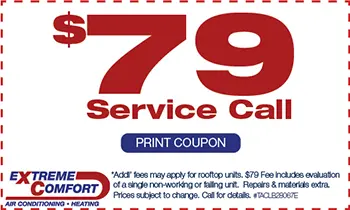Should I Repair or Replace My Air Conditioner?

Every homeowner will eventually come to a crossroad where they face the decision to repair or replace their existing air conditioner. Either way, this is essential since the wrong choice can ultimately cost you more money in the long run. So the big question is, how do you make a good decision? Here are some bullet points to consider:
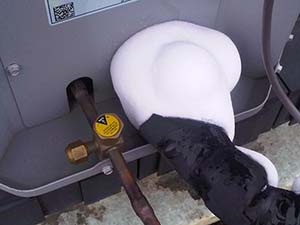
- Is your old system over 10 years old and needs frequent attention?
- Does your home not feel as comfortable as it once did?
- Is there a lack of air flow or balanced air flow throughout your home?
- Is your current AC unit making strange noises or has a foul smell?
- Are your energy bills high?
- Is there ice forming on the outside AC unit?
If you answered yes to any of these questions, you are correct in questioning whether to repair or replace your AC system. Let’s start with the basics.
Average Air Conditioning System lifespan in Dallas, TX
The lifespan of an AC system depends on several factors starting with geographical location. In Dallas, TX, where we have on average 234 sunny days per year (U.S. average is 205) and an average of 106 days per year over 90 degrees coupled with higher than normal humidity during those summer months, air conditioners are put under a great amount of strain when trying to keep your home cool during these hot summer months. In these conditions an ac system in the DFW metroplex will last on average between 10-15 years if well maintained. But ultimately, even the best maintained heating and air conditioning system will ultimately need to be replaced; here are some things to consider.
How often does your AC System need repair?
Whether to repair or replace your air conditioner starts by clarifying that most air conditioning systems CAN be repaired and will continue to work the best they can. However, that statement comes with a qualifier: an older, failing HVAC system can be repaired but it will never work as efficiently as it did when you first purchased it and it certainly won’t be as energy efficient as a new, higher SEER system. But yes…replacing existing parts that are failing will be the first choice for many homeowners, however if the need for AC repair is an annual event, it may be time to consider a cost benefit analysis of whether to repair or replace your air conditioner.

Schedule Service
Cost Benefit Analysis
Whether to Repair or Replace your air conditioner should start with a Cost Benefit Analysis. To clarify, a cost-benefit analysis is a systematic process used to measure the benefits of making one decision over another.
measure the benefits of making one decision over another.
For instance, let’s start with the cost of maintaining your existing system; this includes all repair costs, the additional expense of the electricity necessary to run an older, less efficient system, and let’s not forget the annoyance and discomfort you feel every time your system breaks down during the heat of the summer or cold of the winter and have to call for repair.
Now compare that to the cost of a new system, but also factor in that this new system will run more efficiently and reduce your energy costs. Plus, since it will be a new AC system, it probably won’t need repair for the foreseeable future and if it does, the new system will likely come with a manufacturer’s warranty.
How much do AC repairs cost?
Something to take into account when doing your cost-benefit analysis is the potential price tag of future AC repairs. The most common repairs and the approximate costs are:
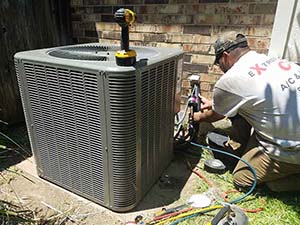
- Replace the Condenser Fan – $350-$650
- Replace the Compressor – $2500-$4500
- Replace the Condenser Coil – $2,500-$4,000
- Replace Capacitors – $100-$450
- Replace the Blower Motor – $600-$1200
- Replace blown fuses – $50-$100
- Replace the Circuit Board – $495-$895
- Replace the Evaporator Coil $2500-$4500
- Replenish Refrigerant – $75-$125/pound (most systems need between 2 and 20 pounds based on the size of the unit)
Now that you have some of the more common costs to repair an AC system, you can make a more informed decision to repair or replace your air conditioning system.
Does your system require R-22 Freon?
Hydrochlorofluorocarbon (brand name Freon) is a non-combustible gas that is used as a refrigerant in air conditioning systems; Freon is what makes your ac system cool the air. Without Freon, your air conditioner won’t cool.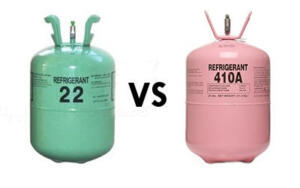
Older air conditioning systems use R-22 Freon but as of January 1, 2020, R-22 Freon is no longer produced do to its negative effects on the environment according to the Environmental Protection Agency (EPA).
R410a refrigerant has replaced R-22, however, simply replacing R-22 refrigerant with R410a refrigerant in your existing system is not a practical solution due to the costs involved and the incompatible nature of R410a refrigerant with an older R-22 system.
So, if you have an older AC system that is failing and uses R-22 refrigerant, installing a new air conditioning system might be your best solution.
How long do you plan to live in your home?
Although this part of your Cost Benefit Analysis can be tricky, it is worth taking into account your future plans. If you don’t plan on moving for the foreseeable future and maintaining your existing system has become cost prohibitive, then replacing your system is probably the best option.
Now…if you are planning on moving within the next couple of years, your analysis becomes a bit trickier. Your first thought might be that you don’t want to
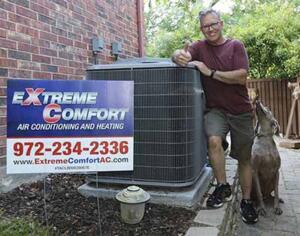
incur the cost of a new system just to move in a few years; however, there are two things to think about. First, how much is your comfort and peace of mind worth for the next few years? Second, knowing that a home with a newer AC system will sell quicker and for more money than a home with a failing system, does it make sense to purchase a new AC system in your home? In many cases yes, however, this is a decision that only you can make.
The Takeaway
The decision to repair or replace your air conditioner is important mainly because of the costs involved. The first place to start is to get an estimate for a new system. Most AC repair companies will provide an estimate FREE of charge which will help you with your cost-benefit analysis.
As you know…we are always here to help, so feel free to contact us and one of our Extreme Comfort Advisors will be happy to give you a FREE, no-obligation estimate for a new air conditioning system.


